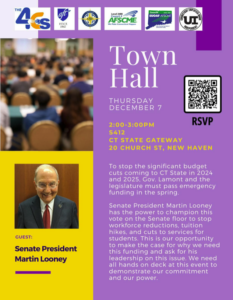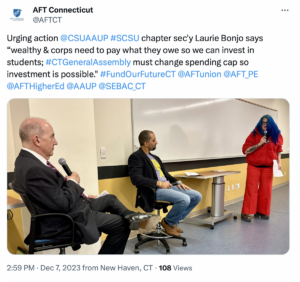This week, on two separate occasions, members of the General Assembly convened behind closed doors to deliberate on matters that not only promise increased taxes and a higher cost of living but also stand to reshape how we go about our daily lives.
The first occasion concerned a union event. The American Federation of State, County and Municipal Employees (AFSCME) Council 4 promoted a Town Hall meeting featuring Senate President Martin Looney (D-New Haven) that was held on Thursday (Dec. 7). The purpose was to address expected budget cuts impacting the state’s colleges and universities and to demand emergency funding.
The gathering, hosted by AFSCME, the Connecticut American Federation of Teachers (AFT), the Congress of CT Community Colleges (4C’s) and the Connecticut State University American Association of University Professors (CSU-AAUP) is demanding that Gov. Ned Lamont and the legislature approve emergency funding in the upcoming session to address the looming budget cuts.
Currently, the University of Connecticut (UConn) is facing a $70 million deficit in the 2024-25 fiscal year. Similarly, the Board of Regents for Higher Education (BOR) — responsible for overseeing 12 community colleges, four regional state universities and the online Charter Oak College — anticipates a $140 million budget shortfall, equal to 11% of the total system budget.
Responding to my RSVP to the event, 4C’s Communications Director Ellen Benson stated, “It’s a private event, and we will not be accommodating media for this event.”
However, the unions extended the invitation to Sen. Looney, citing his influence in securing additional taxpayer dollars and his “power to champion this vote on the Senate floor.” Unhappy with potential cuts that could lead to workforce reductions, tuition increases and service cuts, the unions aim to present their case for additional money from taxpayers. Essentially, they seek Sen. Looney to spearhead efforts on this matter, expressing discontent with the thought of losing dues-paying members.
According to AFSCME in a Facebook post, “Sen. Looney can champion a vote in the Senate to pass emergency funding to prevent these appalling actions.”
Those privileged enough to receive approval to attend were informed that the unions require “all hands-on deck at this event to demonstrate our commitment and our power.”
As the meeting was closed to both the public and the media, the specifics of what transpired remain unknown. However, glimpses were shared by AFT through social media posts.
Laurie Bonjo, the CSU-AAUP chapter secretary, said that the “wealthy and corporations need to pay what they owe so we can invest in students.” She emphasized that the “General Assembly must change [the] spending cap so investment is possible.”
Ms. Bonjo did not explicitly specify what is considered as “owed,” but it is noteworthy that Connecticut has the 15th highest corporate tax rate in the nation, and holds the 5th highest tax burden for income and property taxes.
AFT also shared a post from the State Employee Bargaining Agent Coalition (SEBAC) urging people to tell Gov. Lamont that “students can’t afford a 5 percent tuition hike.” SEBAC conveniently forgot about their substantial 2022 contract worth almost $2 billion. This contract included 2.5 percent annual wage increases from 2021-2024, along with step increases, retroactive raises and a $3,500 bonus — funds that could have been utilized to address the budget gap of the colleges.
It’s also worth highlighting that the SEBAC agreement also incorporates a contract reopener in 2025, foreseeing additional pay hikes. Interestingly, the very unions advocating for emergency funding are the ones anticipating future pay increases.
Perhaps someone should remind SEBAC that every time their contract hikes fixed costs for the state, the funds have to be sourced from somewhere. In this instance, it’s the students who end up shouldering the burden.
The unions may be shocked when they realize the usual concessions, they typically secure may not be guaranteed this time. Gov. Lamont does not seem interested in altering the state’s fiscal guardrails — including the spending cap. In a Nov. 13 press release, he reiterated the importance of these guardrails, emphasizing how they have consistently contributed to “enhancing Connecticut’s fiscal health and strengthening our state.”
Meanwhile, House Democrats met for a closed caucus this week on Monday (Dec. 4) to deliberate on the future of gas car sales in the state. According to CT Mirror, discussions revolved around the financial implications of banning gas cars for constituents, the existing infrastructure’s inadequacy to support electric car charging and the state’s readiness to handle the impact of a transition to all-electric cars on the electric grid.
No definitive commitments were made during this session, and the legislators are planning another caucus. However, Majority Leader Jason Rojas (D-East Hartford) mentioned, “We haven’t figured out exactly what direction we’re going to take on this yet.” He further clarified that “this was really kind of a temperature-check caucus and to get initial concerns on the table.
Rep. Rojas deserves credit for being forthright about the meeting’s outcome. Hopefully, there will be fewer closed-door sessions, given the widespread unpopularity of this proposal in the state. Among nearly 4,000 testimonies submitted by individuals expressing their views on this regulation, 75% voiced opposition to the ban.
The regulation was so unpopular that Gov. Lamont withdrew it from the committee responsible for its approval. Instead, the decision will be determined by the full legislature in the upcoming session that begins in February.
As we await the verdict on the future of gas cars, lawmakers must understand the critical need for decisions with significant repercussions to be deliberated in the public eye, ensuring transparency and allowing citizens insight into the actions of those in positions of power.
This week on Yankee’s podcast Y CT Matters
What is Hanukkah and what does it mean for the Jewish people this year, especially in light of the ongoing war between Israel and Hamas? Rabbi Ari Weisenfeld, director of Agudath Israel of America office in Connecticut, explains the holiday’s history and why it has been, and remains, a source of spiritual strength for the Jewish people over thousands of years.
Click HERE to listen




